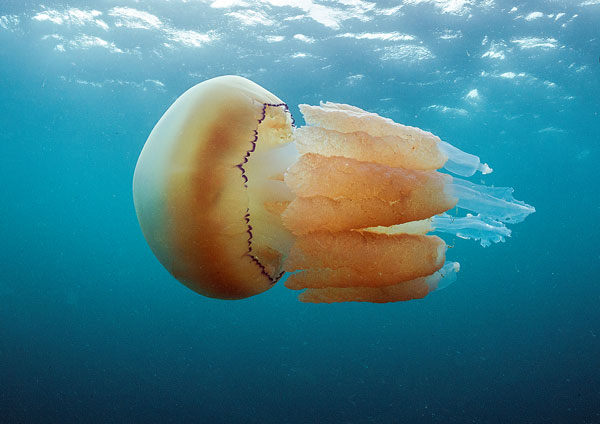The Irish Sea Network has published its first ever review. It examines the increasing pressure from climate change and activities such fishing, aquaculture, development, shipping, aggregates, military activity, recreational activity and pollution.
The Network says that while 36 per cent of the Irish Sea is designated as a Marine Protected Area, only approximately five per cent has any management in place and less than 0.01 per cent is fully protected. The group goes on to say that while more than 15 million people live around the Irish Sea and many more visit for holidays, only a small percentage of them realise what wildlife lives there and just how important it is for biodiversity and the environment. (Photo: Barrel jellyfish by Mark Thomas)
Conservationists representing six countries and a number of different organisations – Manx Wildlife Trust, North Wales Wildlife Trust, the North West Wildlife Trusts, Scottish Wildlife Trust, Sustainable Water Network (Ireland), The Wildlife Trust of South and West Wales and Ulster Wildlife – have come together to press for action.
Review of the Irish Sea 2022
The Irish Sea Network has produced a Review of the Irish Sea 2022 and has laid down their vision and calls to action to protect and improve the health of the Irish Sea.
Head of Marine at the North West Wildlife Trusts, Georgia de Jong Cleyndert says:
“Working together is essential. Wildlife does not adhere to lines drawn on maps, so we need to think at an Irish Sea scale. Whilst there are some protection measures in place for the Irish Sea, management is weak.
Millions of people around the Irish Sea rely on it for food, employment and wellbeing, but many overlook its role in fighting against climate change and its importance for wildlife – few know about the incredibly diverse habitats that support a huge amount of amazing wildlife – giant basking sharks, leatherback turtles, beautiful starfish and jellyfish, dolphins, porpoises, seal and sharks, as well as internationally important seabirds like Manx shearwater and guillemots.
We must ensure that damaging activities like dredging, development and damaging fishing practices are managed to ensure that vitally important areas for the environment are protected and we give space for nature’s recovery.”
The Network have produced two documents to push for better management of the Irish Sea:
